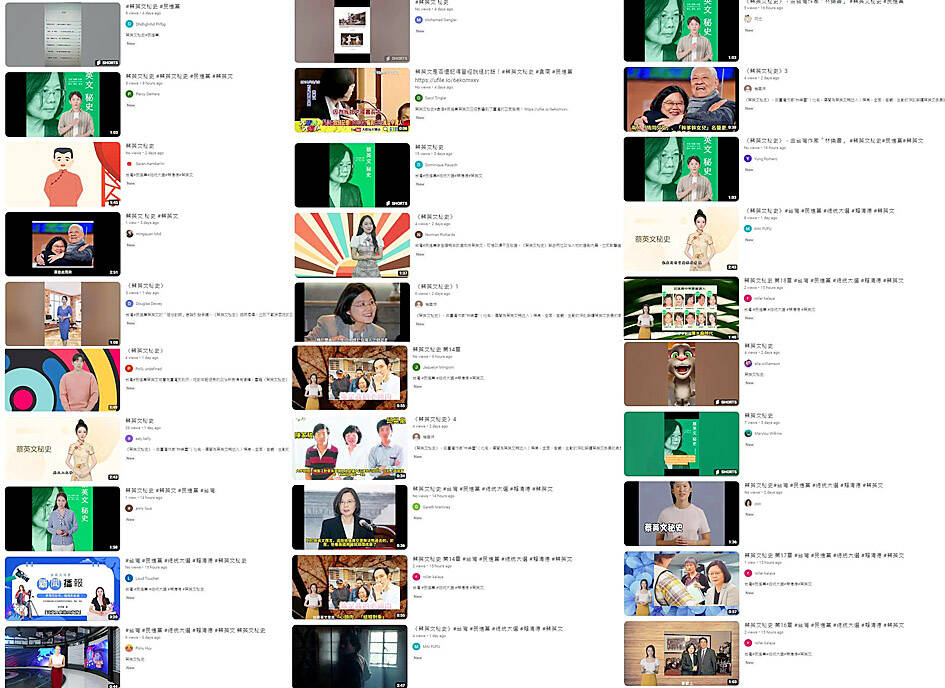Beijing is mass-posting videos featuring a false “secret history” of President Tsai Ing-wen (蔡英文) on hundreds of social media accounts in a disinformation push ahead of Saturday’s presidential election, sources said.
The Secret History of Tsai Ing-wen (蔡英文秘史) is a 300-page document containing rumors and negative content first published last month on the online open repository Zenodo.
The material is being turned into hastily produced videos with artificial intelligence (AI)-generated voiceovers and fake hosts, and being posted on YouTube, Instagram, X and other platforms, a national security official familiar with the matter said on condition of anonymity.

Photo: Screen grab from Austin Wang’s Facebook page
The content’s creation and spread bore the characteristic traits of an informational operation by the Chinese Ministry of State Security, the official said.
The videos, which were being shared about 100 times per minute, were promptly replaced if deleted by platforms or the accounts were banned and had been edited using Capcut, software developed by Chinese firm ByteDance Ltd (字節跳動), which owns Douyin, they said.
The videos used virtual hosts, including characters that resembled Chinese-speaking newscasters, foreigners, and in at least one instance, Santa Claus, they said.
However, the content did not generate high rates of engagement due to the low production quality, including the artificial appearance and voice of the virtual hosts, and the use of Chinese-language terms not commonly used by Taiwanese, the official said.
The campaign used more social media platforms than usual, including a manga subforum of the online bulletin board Professional Technology Temple, Mirror Literature and a Facebook group for real-estate listings, they said.
China is known to wage disinformation campaigns against leaders of democratic states, including one last year targeting Canadian Prime Minister Justin Trudeau, but the recent operation exceeded it in scale and resources, the official said.
Beijing is likely using Taiwan as a test bed for information warfare techniques that could be deployed against other countries while still damaging the Democratic Progressive Party at the ballot box on Saturday, the official said.
Austin Wang (王宏恩), an associate professor of political science at the University of Nevada, echoed the official’s assessment.
As of Tuesday, more than 100 nearly identical videos had been uploaded to YouTube since Sunday, Wang said.
The videos were mostly a recital by an AI-created virtual host of the same document and pictures chosen by an algorithm, he said, adding that all of the uploads had single-digit view counts.
The flood of videos suggests that Beijing has the ability to create the impression that the material is generating public interest, he said.
“There is no doubt this activity is coordinated and a show of force,” Wang said. “Its scale far exceeded anything we tracked before.”

‘ABUSE OF POWER’: Lee Chun-yi allegedly used a Control Yuan vehicle to transport his dog to a pet grooming salon and take his wife to restaurants, media reports said Control Yuan Secretary-General Lee Chun-yi (李俊俋) resigned on Sunday night, admitting that he had misused a government vehicle, as reported by the media. Control Yuan Vice President Lee Hung-chun (李鴻鈞) yesterday apologized to the public over the issue. The watchdog body would follow up on similar accusations made by the Chinese Nationalist Party (KMT) and would investigate the alleged misuse of government vehicles by three other Control Yuan members: Su Li-chiung (蘇麗瓊), Lin Yu-jung (林郁容) and Wang Jung-chang (王榮璋), Lee Hung-chun said. Lee Chun-yi in a statement apologized for using a Control Yuan vehicle to transport his dog to a

Taiwan yesterday denied Chinese allegations that its military was behind a cyberattack on a technology company in Guangzhou, after city authorities issued warrants for 20 suspects. The Guangzhou Municipal Public Security Bureau earlier yesterday issued warrants for 20 people it identified as members of the Information, Communications and Electronic Force Command (ICEFCOM). The bureau alleged they were behind a May 20 cyberattack targeting the backend system of a self-service facility at the company. “ICEFCOM, under Taiwan’s ruling Democratic Progressive Party, directed the illegal attack,” the warrant says. The bureau placed a bounty of 10,000 yuan (US$1,392) on each of the 20 people named in

The High Court yesterday found a New Taipei City woman guilty of charges related to helping Beijing secure surrender agreements from military service members. Lee Huei-hsin (李慧馨) was sentenced to six years and eight months in prison for breaching the National Security Act (國家安全法), making illegal compacts with government employees and bribery, the court said. The verdict is final. Lee, the manager of a temple in the city’s Lujhou District (蘆洲), was accused of arranging for eight service members to make surrender pledges to the Chinese People’s Liberation Army in exchange for money, the court said. The pledges, which required them to provide identification

INDO-PACIFIC REGION: Royal Navy ships exercise the right of freedom of navigation, including in the Taiwan Strait and South China Sea, the UK’s Tony Radakin told a summit Freedom of navigation in the Indo-Pacific region is as important as it is in the English Channel, British Chief of the Defence Staff Admiral Tony Radakin said at a summit in Singapore on Saturday. The remark came as the British Royal Navy’s flagship aircraft carrier, the HMS Prince of Wales, is on an eight-month deployment to the Indo-Pacific region as head of an international carrier strike group. “Upholding the UN Convention on the Law of the Sea, and with it, the principles of the freedom of navigation, in this part of the world matters to us just as it matters in the